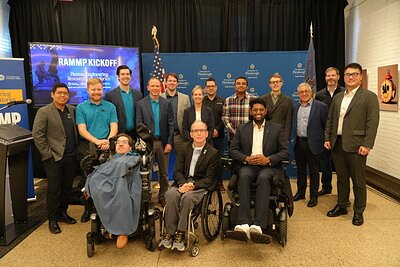
AI-Powered Mobility: $41M Initiative Redefines Independence for Millions
ARPA-H's ambitious investment in robotic assistive technology, led by ATDev, promises a future where mobility is no longer a barrier to independence. This initiative goes beyond wheelchairs, pushing the boundaries of AI and robotics.
AI-Powered Mobility: $41M Initiative Redefines Independence for Millions
Berkeley, CA – A $41 million initiative, spearheaded by the Advanced Research Projects Agency-Health (ARPA-H) and driven by innovative firm ATDev, is poised to revolutionize assistive technology, moving beyond traditional mobility aids to unlock unprecedented independence for millions. The Robotic Assistive Mobility and Manipulation Platform (RAMMP) program isn't simply about building better wheelchairs; it’s about creating a future where sophisticated AI and robotics seamlessly integrate into daily life, empowering individuals with disabilities to live more fulfilling and autonomous lives.
ARPA-H, known for funding high-risk, high-reward research, has identified assistive robotics as a critical area for advancement. The agency believes that breakthroughs in this field have the potential to dramatically improve the quality of life for a growing population – not only those with disabilities, but also the aging population increasingly seeking solutions to maintain their independence. “The need is significant and growing,” explains a source familiar with ARPA-H’s investment strategy. “We’re looking at technologies that go beyond simply compensating for limitations, and actually enhance capabilities.”
Beyond the Wheelchair: A Platform for Innovation
The RAMMP program’s ambition extends far beyond incremental improvements to existing assistive devices. The core of the initiative is the development of an open-source platform – a modular, adaptable system that can be customized to meet the unique needs of individual users. ATDev, a relatively young company founded in 2020, has quickly emerged as a key player in this space, bringing a fresh perspective and a commitment to user-centered design.
“The real opportunity lies in creating a platform, not just a product,” states a spokesperson for ATDev. “By developing open-source software and hardware components, we can foster collaboration among researchers, engineers, and users, accelerating the pace of innovation.” This platform approach will allow for the integration of a wide range of sensors, actuators, and AI algorithms, enabling assistive devices to respond intelligently to their environment and adapt to changing user needs.
The AI Revolution in Assistive Technology
At the heart of RAMMP is the integration of artificial intelligence. Researchers are exploring a variety of AI-powered features, including:
- Autonomous Navigation: Assistive devices that can navigate complex environments without human intervention, avoiding obstacles and safely guiding users to their destinations.
- Object Recognition and Manipulation: Robotic arms and grippers that can identify, grasp, and manipulate objects, enabling users to perform tasks that would otherwise be difficult or impossible.
- Personalized Assistance: AI algorithms that learn user preferences and adapt to their individual needs, providing customized assistance and support.
- Predictive Assistance: Systems which can anticipate the user’s needs based on learned behavior and environment.
“We’re moving beyond simple automation to true intelligence,” explains a robotics expert involved in the project. “The goal is to create devices that can think for themselves, anticipate user needs, and provide seamless, intuitive assistance.”
Addressing Ethical Considerations and Accessibility
While the potential benefits of AI-powered assistive technology are immense, researchers are also acutely aware of the ethical challenges. Concerns about data privacy, algorithmic bias, and accessibility are paramount.
“It’s crucial that these technologies are developed responsibly and ethically,” states a bioethicist involved in the project. “We need to ensure that they are accessible to all, regardless of their socioeconomic status or geographic location.”
ATDev is committed to addressing these concerns through a user-centered design process that prioritizes inclusivity and accessibility. The company is working closely with disability rights organizations and advocacy groups to ensure that its technologies meet the needs of diverse users.
The Future of Mobility
The RAMMP program is not just about improving assistive technology; it's about reimagining the future of mobility. As the population ages and the prevalence of disabilities increases, the demand for innovative assistive solutions will only continue to grow.
“We’re on the cusp of a major transformation in the way people with disabilities live and work,” predicts a source familiar with the project. “AI-powered assistive technology has the potential to unlock a new era of independence, productivity, and quality of life.”
The $41 million investment in RAMMP is a testament to the growing recognition of the importance of assistive technology. It signals a shift towards a more inclusive and accessible future, where everyone has the opportunity to live a fulfilling and autonomous life. The open-source nature of the platform, coupled with ATDev’s commitment to user-centered design, positions this initiative as a catalyst for innovation and a beacon of hope for millions of people around the world. The next five years of the program will be critical, focusing on prototyping, testing, and ultimately, bringing these groundbreaking technologies to market, and into the lives of those who need them most.
ATDev’s commitment to open collaboration will likely lead to other startups and innovators building on the foundational work, further accelerating the pace of development and driving down costs, making these life-changing technologies more accessible to all.
